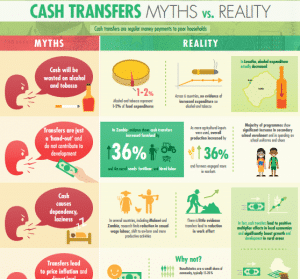
Policy highlights:
- In this infographic the Food and Agriculture Organization (FAO) and UNICEF bust five myths about provision of cash transfers to poor households in developing countries. These include:
- Cash will be wasted on alcohol and tobacco > Across 6 countries, no evidence was found of increased expenditure on alcohol and tobacco.
- Transfers are just a ‘hand-out’ and do not contribute to development > Research shows cash transfers led to increases in farmland; in the use of seeds, fertilizer and hired labor; in overall production (36%); and in secondary school enrolment and spending on school uniforms and shoes.
- Cash causes dependency, laziness > Research finds that cash transfers have positive multiplier effects in local economies and significantly boost growth, productive activities and development in rural areas.
- Transfers lead to price inflation and disrupt local economy > In 6 case study countries no inflation was detected and cash transferred by the programme yielded profits for local economies
- Child-focused grants increase fertility > No impact on fertility was found and in three countries early pregnancy was significantly reduced.








